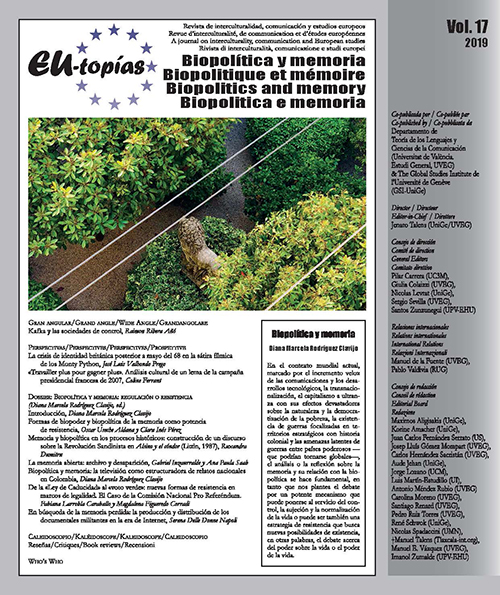The crisis of British Identity after May 1968 in the Satiric Films of Monty Python
DOI:
https://doi.org/10.7203/eutopias.0.18318Keywords:
Postmodernity, story, identity, character, parody, satire, Monty Python Abstract
Abstract
The text presents a reading of the media construction of national identities from the point of view of film parody and satire, two genres associated with Monty Python’s production. It also analyzes the way in which postmodernity has brought about a modification in the archetypes of film narratives as an attempt to revitalize or re-enchant such stories, which suffered the rationalization of Hollywood canonical model. Monty Python’s films took advantage of the parodies of the canon to satirize and resist the national identities in which the members of the group were socialized
 Downloads
Downloads
 References
References
BAKHTIN, M. (1990), La cultura popular en la Edad Media y en el Renacimiento: el contexto de François Rabelais. Madrid: Alianza Editorial.
BARKER, C. (2003), Televisión, globalización e identidades cul- turales. Barcelona: Paidós Ibérica.
BORDWELL, D. (1985), Narration in the Fiction Film. Wisconsin: University of Wisconsin Press.
BUTLER, J. (2011), Bodies that matter: On the discursive limits of sex. Bodies that Matter: On the Discursive Limits of Sex. https://doi.org/10.4324/9780203828274.
DE CILLIa, R., REISIGL, M., & WODAK, R. (1999), The discursive construction of national identities. Discourse and Society. https://doi.org/10.1177/0957926599010002002
FOUCAULT, M. (1984), La ética del cuidado de uno mismo como práctica de libertad. Revista Concordia. https:// doi.org/10.1007/s13398-014-0173-7.2.
GIDDENS, A. (2016), Modernity and self-identity. In Social Theory Re-Wired: New Connections to Classical and Con- temporary Perspectives, second edition. https://doi.org/10.4324/9781315775357
HALL, S. (1996), The Question of Cultural ldentity. Modernity: An Introduction to Modern Societies. https://doi.org/ großbritannien;cultural studies.
JOHNSTONE, K. (1979), Impro: Improvisation and the Theat. Routledge. https://doi.org/10.4324/97802034 46294.
LYOTARD, J.-F. (1991), La Condición postmoderna. Grandes obras del pensamiento contemporáneo. https://doi.org/10.1017/CBO9781107415324.004.
METZ, C. (1982), The Imaginary Signifier: Psychoanalysis and the Cinema. The SAGE Handbook of Film Studies. https://doi.org/10.4135/9781849200400.n15.
VALHONDO CREGO, J. L. (2011), Monarchy, jesters, politicians and audiences comparison of TV satire in UK and Spain. Revista Latina de Comunicacion Social. https://doi.org/10.4185/RLCS-66-2011-932-252-273-EN.
WODAK, R. (1999), «Critical Discourse Analysis at the End of the 20th Century». Research on Language & Social Interaction. https://doi.org/10.1080/08351813.1999.9683622.
Downloads
Published
How to Cite
-
Abstract332
-
PDF (Español)123
Issue
Section
License
![]()
The authors conserve the copyright. All content published in EU-topías. Journal of interculturality, Communication, and European Studies are subject to the license Creative Commons Attribution-NonCommercial-ShareAlike 4.0 license. The full text of the license can be found at <http://creativecommons.org/licenses/by-nc-sa/4.0>
They may be copied, used, disseminated, transmitted and publicly displayed, provided that:
- The authorship and original source of the publication is cited (journal, publisher and URL of the work).
- They are not used for commercial purposes.
- The existence and specifications of this license of use are mentioned.
It is the responsibility of the authors to obtain the necessary permissions for images that are subject to copyright.



